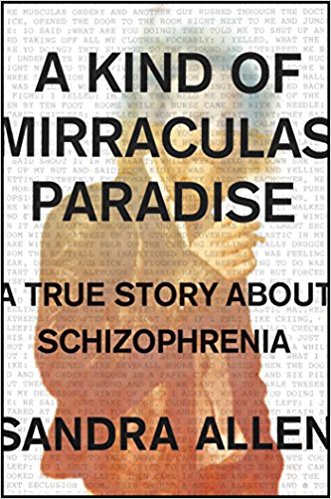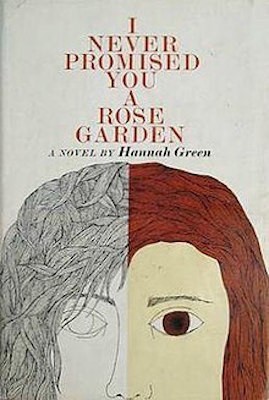Reading Lists
9 Hopeful Books About Schizophrenia
Stories about mental illness can be honest without being depressing

I n August, 2009, I got something in the mail from my uncle Bob. I didn’t know Bob very well; he was a self-described “hermit” who lived in the Californian desert. It was the story of his life, which he’d typed in all-capital letters on his typewriter, a stack of about sixty misspelled pages that stunk of cigarettes and were punctuated mostly with colons. On a cover page, he described it as a “true story” about being “labeled a psychotic paranoid schizophrenic.” On the phone, he explained he wanted my help with getting his story “out there.”
The more I learned about schizophrenia, the less I felt I could answer something as seemingly basic as “what is it?”

Soon after I began to write a version of Bob’s story based on what he sent me. Eight years later and it’s grown into a book called A Kind of Mirraculas Paradise: A True Story about Schizophrenia that’s being published by Scribner on January 23. My version tells Bob’s story faithfully to the facts as he shared them. It also endeavors to better understand that phrase: “psychotic paranoid schizophrenic.”
Before my uncle sent me his manuscript, I knew virtually nothing about what the term schizophrenia meant or didn’t mean. So I started reading. A lot. I read psychiatric books and anti-psychiatric books and books by family and friends of people who’ve been diagnosed with mental illnesses. I read books by self-identified “mad” people and “psychiatric survivors.” I read books about science and history and disabilities studies. I read memoirs and novels and poems and plays. I interviewed lots of people, too, and spoke with people informally. I spoke with anybody who might have some perspective to lend on these topics. Because, it became clear, the answer to a question like “What is schizophrenia?” isn’t simple. For a long time, the more I learned about schizophrenia, the less I felt I could answer something as seemingly basic.

Often someone I’ve just met will ask what I do, and we’ll get to talking about my uncle Bob and what he mailed me. We’ll end up talking about schizophrenia. We’ll talk about mental illness more generally and mental healthcare in America today. Sometimes we’ll talk about what a better future could look like. Sometimes people I’m speaking with decide to tell me their connection to schizophrenia; they’ll often tell me about someone they love, or they’ll tell me about the work they do, or occasionally they’ll tell me about themselves.
The following are books I find myself recommending to people. My hope is that they’re works that are approachable for readers brand new to this topic but also stories that will be illuminating even to those already entrenched in these complex topics. Something I’ve noticed is that books about the topic “schizophrenia” skew sad; some are downright pessimistic. I have tried to present works that speak about schizophrenia honestly, and yet do so with a measure of hope.

The Gene: An Intimate History by Siddhartha Mukherjee
This is a deeply considered and gorgeously rendered work, part memoir and part clear-eyed assessment of the past, present and future of genetic study. Mukherjee, both a physician and gifted writer, begins by describing the several members of his family whose lives have been devastated by schizophrenia. In order to better understand schizophrenia, he explains all of genetics generally, unraveling the fascinating story of how researchers have come to know what they do about genes. Arriving in the present day about halfway through the book, he then shifts into exploring the ramifications of genetic knowledge today. He discusses such matters as race and gender and identity and intergenerational trauma and psychiatric diagnoses like schizophrenia. I think the world would be a better place if everybody read The Gene.

I Never Promised You a Rose Garden by Joanne Greenberg
This 1964 novel fictionalizes the author’s self-described descent into and recovery from schizophrenia right before the dawn of psychopharmaceuticals in the late forties and early fifties. The book rivetingly animates the protagonist’s elaborate inner world, and the devoted efforts of her psychiatrist — who is based on a real-life doctor, Dr. Frieda Fromm-Reichmann. Rose Garden was initially published under a penname at the behest of Greenberg’s mother. It resonated with a surprising number of readers, becoming an unexpected bestseller and inspiring many adaptations. Today Rose Garden remains something all too rare: a widely read story about schizophrenia written by someone who had herself been diagnosed. It’s a very powerful and formally daring work, one that remains as necessary as ever.

Agnes’s Jacket by Dr. Gail Hornstein
In this memoir, an academic psychologist traces her own journey toward a more scientific and historically grounded understanding of madness. I recommend this book particularly for mental health care professionals seeking to better understand schizophrenia and other severe mental illnesses, and to those partaking in the debates about how to best treat people diagnosed. For those interested in psychiatry, I also recommend Dr. Hornstein’s thorough biography of Dr. Frieda Fromm-Reichmann (of Rose Garden fame), To Redeem One Person is to Redeem the World.

Mad in America by Robert Whitaker
In this exemplary work of narrative investigative journalism, Whitaker begins with a confusing proposition: a WHO study that found that in richer nations like America, there are worse outcomes than in poorer ones for people diagnosed with severe mental illnesses like schizophrenia. Puzzled, Whitaker began to look at why or how that could be. In this groundbreaking work, first published in 2001, Whitaker comprehensively tells the story of American mental health care, unfolding how the public came to know what we do about psychiatric disorders like schizophrenia and psychiatric treatments like antipsychotics. I also highly recommend another of his books, Anatomy of an Epidemic, which looks at the skyrocketing cost of the growing population of Americans today disabled by mental illness.

The Protest Psychosis: How Schizophrenia Became a Black Diseaseby Jonathan Metzl
In the 1950s, half a million Americans lived in public mental hospitals, a number that has since fallen dramatically. In this academic book, Metzl analyzes historical psychiatric records from one public hospital, observing a clear story of how the label “schizophrenia” was disproportionately applied to different groups at different historical periods. The end result deftly demonstrates how psychiatric diagnoses may be wielded as tools of racist and misogynist oppression.

The Voices Within by Charles Fernyhough
An engaging popular science book that examines how little we understand the internal experiences of people generally — not only those diagnosed with schizophrenia. What is thought? How do scientists study thought? This book also provides an introduction to the Hearing Voices movement, a civil rights movement for self-identified voice-hearers that has emerged over the last three decades. Fernyhough contemplates the voices “heard” by creative writers such as myself, and closely examines several historical and literary examples of this other sort of voice hearing.

The Origins of Consciousness and the Breakdown of the Bicameral Mind by Julian Jaynes
This (in)famous psychology tome, published in the 1970s, offers a particular thesis about the evolution of human beings, specifically to do with consciousness. Jaynes argues that humans in Homer’s Iliad were not conscious in the modern sense; instead, he posits, they hallucinated directions from Gods, i.e., voices. In support of his argument he mentions the existence of people diagnosed with schizophrenia, who claim to hear voices. In the late eighties, a Dutch woman named Patsy Hague who’d long been diagnosed with schizophrenia — she heard many voices — read Jaynes’ book. She afterward worked to convince her psychiatrist, Dr. Marius Romme, of the realness of her voices. The two appeared on a Dutch daytime show asking voice hearers to call in — and to their surprise many did. They then held a meet-up for voice hearers, which many mark as the beginning of the Hearing Voices movement. These gatherings allowed voice-hearers to realize that they were uniquely equipped to help one another strategize about how to live not just despite but with their voices. The first Hearing Voices Network support groups were held soon after in the UK; today there are HVN meetings in about 30 nations worldwide. To those interested in learning more about the Hearing Voices movement, I’d recommend Living with Voices: 50 Stories of Recovery by Dr. Marius Romme himself and his wife and longtime collaborator, the journalist Sandra Escher, as well as three other prominent figures in the movement. The book presents 50 narratives of people who’ve heard voices or seen visions or had other unusual or extreme experiences.

The Loony-Bin Trip by Kate Millett
In this gorgeously wrought memoir, celebrated feminist author Kate Millett vividly portrays the astounding loss of power that can come with psychiatric diagnosis. Though not a story about just schizophrenia, per se, it is one about a dynamic that pervades so many narratives about mental illness: a disagreement about whether someone has to take psychiatric medications. At the story’s beginning, Millett is a celebrated author living a stable life. She decides to stop taking Lithium she’s been prescribed for six years, doubtful of her diagnosis and tired of shaking hands and diarrhea. She soon finds being opposed by nearly everyone in her life. I recommend this book especially to those Millett mentions in her dedication: “to those who’ve been there.”

Outside Mental Health by Will Hall
Hall is a therapist and self-identified schizophrenia survivor and host of the Madness Radio podcast. This collection anthologizes many of the interviews he’s done on the show with people involved with efforts to reform mental health. Together these conversations provide a wide range of points of view on so many matters related to psychiatric diagnosis and treatment and the status of persons given psychiatric diagnoses in our society, as well trauma, oppression, alternative conceptions of madness, and spirituality. I’d most recommend this book, as well as his podcast, to anybody interested in hearing the perspectives of those who’ve been psychiatrically diagnosed about what has and hasn’t helped them live full and dignified lives.










